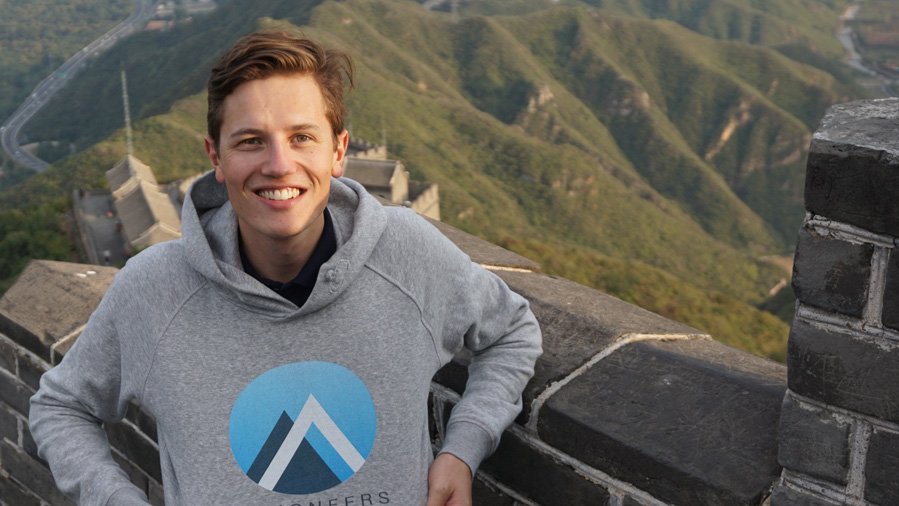Luis Hopf, Hackathon-organizer
The Alps as a project of the heart

Luis, what exactly is a hackathon?
Luis Hopf: the term originates from the field of Computer Science. It’s goal is to work together in teams to come up with useful, creative, or entertaining software products within a short period of time. More generally, it is a kind of innovation competition where solutions to given problems should be generated. Our project is a hackathon with focus on the Alps.
By "we", you are referring to Maxim Frenkel, Magdalena Daxenberger, and yourself?
Yes, we call ourselves "Alpioneers" because we think this term describes our intention very well. In the past, it was up to mountain pioneers to find new paths. Now, we want to do something similar with ”InnovateTheAlps” and lead to new ways – to contribute to a sustainable development of the Alps.
How do you get to know each other?
We got to know each other because of a scholarship of the Bavarian EliteAkademie, which is awarded annually to 40 students from Bavarian universities.

How did you come up with the idea for your project "InnovateTheAlps"?
As part of the scholarship, we were supposed to initiate a social project in groups. The three of us quickly realized that we are enthusiastic about the Alps – and the specific idea for our project arose from a visit to the UNWTO Euro-Asian Mountain Tourism Conference in Berchtesgaden in March 2019, which we came across in our research.
What was the conference about?
Among other things, the conference addressed interesting topics such as the aspect of overtourism. I realized how important it is not to destroy the Alps through economic use.
What is special about your project?
At the EAMTC, I noticed that the discussions focused only on the problems. However, it is much more promising to seek solutions. Thus, we decided to organize a weekend with 100 students from different courses of study, as a means to develop solutions.
Who can participate?
Students of all scientific disciplines can apply, but we are also welcome doctoral candidates and young professionals who have recently completed their studies.
Is participation free of charge?
Yes, the selected participants can look forward to an intensive, inspiring, and hopefully enriching weekend including accommodation and meals. To make that possible, we asked companies if there are any specific questions they would suggest. In return, we were granted financial support.
Are all three of you doing this alongside your studies?
Yes, all of us are Master's students, and we invest a lot of our free time in the project.
What questions are addressed?
We have eight partners who have put together a bunch of exciting questions from the areas of high-tech, sports, tourism, and nature & environment. Just a few examples to show how multifaceted the event will be: With the Meter Group, we will address the question of how to measure the soil-plant-atmosphere continuum. Adelholzener wants to investigate how to transport their products to the consumers in a more sustainable and efficient manner. And the track construction company Robel is interested in future mobility by rail.
Are there any topics that you think are missing?
During the course of the project, we found that it is difficult to find a partner who would like to address the topic of overtourism and is able to provide financial support. It would be very interesting to find out more about how to use new technologies to distribute tourists to multiple destinations.
Does that mean that you are planning to repeat the event?
Absolutely. In the first step, we want to show that our plan works. At a second event, we want to place even more emphasis on conservation and sustainable development of the Alps.
How is the hackathon scheduled?
We will start with welcoming our participants and the presentation of the problems. Further, we will try to put together teams that are as diverse as possible before officially starting the working time. On both evenings, there will be input in various forms – and we will work on the problems until late at night. On Sunday afternoon, the groups will present their solutions to a jury and to company representatives.
Will there be winners and prizes?
For sure. Two or three teams each will focus on a specific question, and each company will selects its winner.
What inspired you to organize the event?
I was inspired by the formats of UnternehmerTUM and its founder's scholarship Manage & More. Especially the intensive cooperation with students from different departments was a great experience. It is unbelievable how much energy can be released through the right mix.
What are your goals for the future?
In the future, I definitely want to work in an entrepreneurial fashion. My goal is to drive innovation, perhaps in the field of medical engineering – as there is a lot of potential there. "InnovateTheAlps" is a project of the heart, something to invest a lot of time alongside a full-time job.
(Interview: Verena Pongratz)
Luis Hopf (24) was born in Mühldorf am Inn. He is a student of Robotics, Cognition & Intelligence (RCI – TUM) in his 4th semester, and he describes himself as a nature lover. Currently, he is working on his Master's thesis at the German Aerospace Center, focusing on medical robotics. He also organizes "InnovateTheAlps", which will take place in Hintersee/Ramsau from November 15 to 17, 2019. There are still places available: www.innovatethealps.com